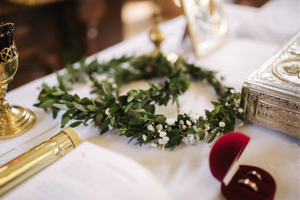Elevation of the Cross

The Exaltation of the Cross or Elevation of the Holy Cross is one of the Great Feasts of the Orthodox Church celebrated every year on September 14.
This day commemorates the discovery of the True Holy Cross of Christ by St. Helen, the mother of Emperor Constantine the Great, in 326 AD.
St. Constantine (Emperor Constantine the Great) sent his mother, St. Helen on a pilgrimage to Jerusalem to find the True Holy Cross of Christ the year of 326 AD. An unknown flower of uncommon beauty and fragrance guided the pilgrimage on where to dig for the cross on Golgotha, the place that Christ was crucified. The sign with the inscription, “Jesus of Nazareth, King of the Jews” also lay among three crosses that were found; the Cross of Christ was found with the other two crosses used to crucify the two thieves of either side of Christ.
In order to determine which one was the true cross, a sick woman was told to kiss each of the three crosses. She kissed the first and second cross with no results. However, when the ailing woman kissed the True Cross, she was immediately made well. It so happened that a funeral procession was passing that way and so the body of the dead man was placed on each of the crosses and when it was placed on the True Cross he came to life -- thus the name of the “Life Giving Cross”, which gives life not only to that man, but to each person who believes in the sacrifice Of Christ on the Cross and His all-glorious three day Resurrection.
When the true Cross was identified, it was lifted on high for all the people to see, who then continually sang ‘Kyrie Eleison’, a practice which is still enacted at current celebrations of the feast.
The flower that guided St. Helen on where to dig for the cross has been named “Vasilikos” or “Basil”, meaning the flower of royalty. The word “Vasilikos” means king since “Basileos” in Greek means “king”. So, the plant Vasilikos or Basil is tied to the Precious Cross of the King of Glory, our Lord Jesus Christ.
The Exaltation of the Cross can be celebrated in various meaningful ways, blending religious observance with cultural and personal reflection. This day is for Christians to meditate on the meaning of the Cross, its role in the faith, and its significance as a symbol of victory over sin and death.
Here are some ways people can celebrate this feast day:
Name days, especially for names like Stavros or Stavroula, which are associated with the Feast of the Exaltation of the Cross, are important in many cultures, particularly in Greece. Godparents may visit their godchildren and bring them a gift; religious or personal.
- Terry Jacobson






Comments 0